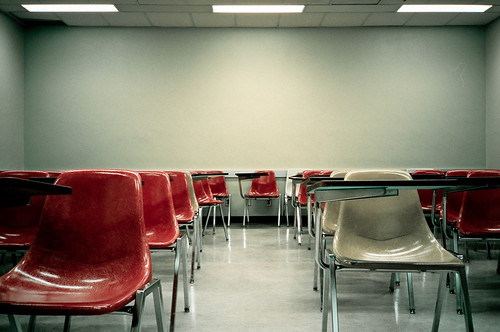 Donald Clark takes the lecture to task (again) as being inappropriate as a form of instruction. This time citing as evidence a recent paper published in Science (available here). This post started as a comment on his blog but outgrew the comment format. So here it is.
Donald Clark takes the lecture to task (again) as being inappropriate as a form of instruction. This time citing as evidence a recent paper published in Science (available here). This post started as a comment on his blog but outgrew the comment format. So here it is.
It is hard to argue that it is silly to assume that having large groups of people spend lots of time being talked at is a great way to learn a complicated subject. Particularly one like physics.
But I don’t think we can make those conclusions solely on the basis of this paper. We knew straight lectures weren’t that great going in. But I’m not sure replacing them with some other format would lead to as great long-term population-wide effects as Donald Clark implies.
1. This was an extremely short study – only one week of three 50 minute sessions. No longitudinal effect was studied (and authors cite other work where despite initial differences in learning, the long-term achievement was the same).
2. The authors reject the Hawthorne effect as a part of the explanation but I find it hard to believe that the increased attendance (which the authors find hard to explain) does not account for the effect of novelty.
3. It is not clear the benefit would be as great in less vocational subjects such as literature or history (although I’m sure, there would some – perhaps a lot).
4. Although the students later reported they would like more of the “new” type of instruction, history shows that rolling out such projects across the system has less of an effect. The new and exciting would become routine and the ability of teachers to use the new method effectively would fluctuate greatly. In fact, I cannot think of a single pedagogic reform that would have increased achievement population-wide.
5. The students in the experimental group received pre-class readings and activities – so we could argue, they got more input than the students who only attended the lectures (if I understood the study design right).
The problem is not with the lecture but with the idea that receiving information is the key part of learning. If that were the case, rote learning would have been just as fine. Lecture’s just as good a way of receiving information as reading materials. In fact, they often work well together. Great lectures can be motivating if their “information acquisition” effect may be rather small. I’ve listened to hundreds of hours of recorded lectures from iTunesU, The Teaching Company, YouTube, LSE podcasts and elsewhere. And I’ve learned a lot about a lot of things. That does not mean I think of myself as an expert in any of those areas. But I could certainly not have acquired as good an overview of so many fields just by reading (can’t read while washing the dishes or walking about – also lectures are often more condensed than written information).
The idea of changing what goes on in the classroom to a more humane interaction while the routine information delivery part is left to machines is not new. It was behind Skinner’s programmed instruction as much it is now behind the flipped classroom meme. With new video technology, we can now split longer lectures into shorter self-study lecture-like segments (sometimes, telling someone something is just as good a way of passing on knowledge as having them find out for themselves).
Very often educators lecture “at” their students because they feel obligated to tell them. And sometimes students expect this. So often what happens in the lecture hall is a ritual of learning. Students feel they “learned” by being told and teachers feel they “taught” by telling. But all of them know at the same time that this is not the best way to go about learning or teaching. I know, I have been there on both sides. Many educators enjoy lecturing – I do. Not because I think it I’m doing a lot of teaching but because it forces me to think of the subject in an organized manner and helps me think of paths the knowledge of the subject. Richard Feynman recommended for this very reason that all scientists teach undergraduates. (So the improvement in the thinking of experts on their subject is not an inconsiderable side effect of lectures – even if it does not justify their current place in education.) But of course, invariably, the questions at the end of a lecture make it clear that many people didn’t get almost anything out of it. Which is why I always supplemented lectures with additional learning activities and would now say I try to supplement learning activities with lectures. Which should probably be the ultimate goal of the re-thinking of lectures. And even though the above may appear polemical with Donald Clark, I think the ultimate shape of educational experiences should be very close to the one he envisions.
